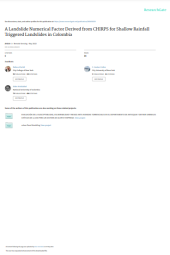A Landslide Numerical Factor Derived from CHIRPS for Shallow Rainfall Triggered Landslides in Colombia
Summary
This study addresses the challenge of obtaining accurate satellite information in tropical regions with dense vegetation, hindering reliable readings for landslide prediction. Focusing on Colombia, the researchers use four years of rainfall data from CHIRPS to create variables representing antecedent wetness and dryness leading to landslides. They developed a logistic regression model incorporating dynamic variables and static parameters, achieving a 73% accuracy in predicting landslide occurrence. The study introduces the Landslide Triggering Factor (LTF) as a satellite-based threshold, outperforming the well-known event duration threshold in both training (71%) and testing (81%) datasets.
Categories:
Article
Publisher:
ResearchGate
Published Year:
2022
